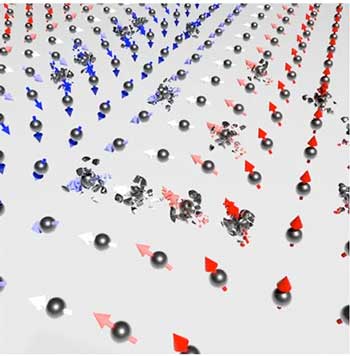| Jul 30, 2020 | |
Researchers enhance electron spin longevity(Nanowerk News) The electron is an elementary particle, a building block on which other systems evolve. With specific properties such as spin, or angular momentum, that can be manipulated to carry information, electrons are primed to advance modern information technology. An international collaboration of researchers has now developed a way to extend and stabilize the lifetime of the electron's spin to more effectively carry information. |
|
| They published their results in Physical Review B ("Enhanced longevity of the spin helix in low-symmetry quantum wells"). | |
 |
|
| Lost of spin orientation by unwanted cubic Dresselhaus magnetic field. (Image: Daisuke Iizasa, Tohoku University) | |
| "We found the new way to use spin degree of freedom as electron spin wave," said Makoto Kohda, paper author and associate professor in the Department of Materials Science at Tohoku University. | |
| The spin property serves as a tiny magnet, which allows it to store information. Spin can also hold quantum mechanical information, a critical tool for quantum computing. Electron spin as a nature of wave function, however, is new, according to Kohda. This is different from the magnetic spin wave, which carries information in a different way. | |
| The electron spin wave, a term coined by Kohda and the research team, carries information, as well. The problem is that the spin wave could only propagate for so long before losing its information. | |
| "We theoretically found a way to enhance the electron spin wave's lifetime by choosing the proper crystal orientations," Kohda said. | |
| In a simulated experiment, the electron spin is confined in a quantum well with various crystal orientations. When the researchers adjusted the orientation of the crystal to allow the spin orientation to sit perpendicularly, the crystal structure partially protected the electron spin wave from relaxing too much. The protection allowed the spin to persist for up to 30% longer than normal. | |
| "We will use this new information carrier, the electron spin wave, for future electronic devices and quantum information advancements," Kohda said. "The next step is to demonstrate how information can be transferred, processed and stored based on the electron spin wave in semiconductor devices." |
| Source: Tohoku University | |
|
Subscribe to a free copy of one of our daily Nanowerk Newsletter Email Digests with a compilation of all of the day's news. |
